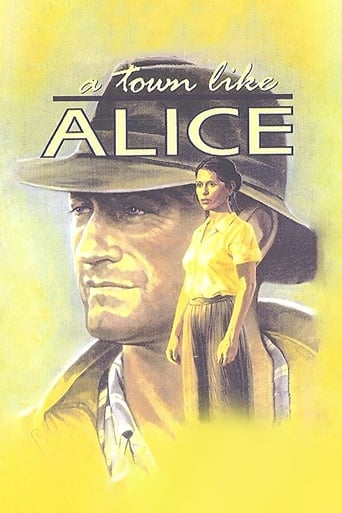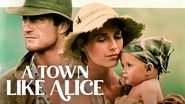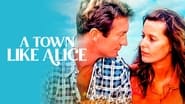clobban
If you love the book, as I do, stop watching the video after Jean and Joe meet in Australia. Up to that point it is a fairly faithful rendition of the book, and the visuals are great. 10 out of 10 to that point and I've enjoyed it many times. After that, the story is seriously rearranged and revised in ways that really destroy the key part of the book, i.e., how Jean creates a town like Alice (Springs). In the early part, the major change is to make Strachan a 40-something bachelor instead of a seventy-year old widower. This rather skews this love story, especially when there are also small changes that contribute to making him more selfish and avaricious, such as: in the book, he intimates to Joe at the ship that he might find more than a letter waiting for him in Australia, but in the video he gives Joe no clue about Jean's whereabouts or intentions. The last hour of the 5-hour video scrunches and mangles the last third of the book. I see no reason why they threw in a fight between Joe and Jean -- it is quite out of character and seems to be just an Aussie dig at Pommies for telling them what to do. Then they bring on Strachan for the wedding (instead of some three years later) -- and have him read the toast!! -- very strange, especially in the context of the relationship between Jean and Noel as cast in the video. The whole wedding scene is the invention of the screenwriters. These abominations take up time in the last hour, which was already not long enough to do justice to the fascinating story of how Jean recreates Willstown as a place where she and Joe can both be happy.
tlawrence19
Jean Paget, Joe Harman, and Noel Strachan--all are unlikely heroes and survivors. Petite but strong Jean whose strength and resolve help save lives, marching hundreds of miles and with calm self-discipline and persuasive powers, Joe Harman ("oh my word") who took risks for Jean and the other prisoners, only to suffer the worst pain imaginable, and Noel Strahan, who trusted Jean regardless of the odds. Her good humor and hardiness inspire everyone around her, and those with the courage to go in with her are rewarded. The beautiful scenery and musical score adds to the adventure. Despite the length it was never boring to me. These ordinary people did extraordinary things and it is based on a true story. Someone borrowed my VHS a few years ago and I never saw it or them again. Learned my lesson, mates, and will buy another copy when it can be found. It's a shame the miniseries is not on DVD.
lsgm1
This movie is a sleeper - I've watched every miniseries that was ever on TV, some many times, and this one is the best. Wonderfully cast, superbly acted, and the characters are well-developed. Helen Morse perfectly fits the part of Jean Paget - strident, in control, sharp, and a bit belligerent. She bounces well off of Joe Harmon, the cowboy/taciturn/"It'll be okay" sort of guy. I was sorry that the movie didn't stick to the book, in that there was no romantic interest between Noel Struan and Jean Paget. For those who don't know, this is taken from a true story about English women marched around Malaya for 3 years by the Japanese, who indeed did not know what to do with them. Very few of them survived. Neville Shute talked to one of them, and this is her story. This movie deserves to be in everyone's collection who loves WWII stories.
Fisher L. Forrest
Apparently this Australian film based on Nevil Shute's novel exists in more than one form. Beware heavily cut versions sometimes shown on cable or satellite, running anywhere from 95 minutes to 2 hours. Only the full 5 hour miniseries version tells the story properly. It is a very close realisation of the story, suffering only from editorial faults commonly found in TV movies: choppiness and episodic progression. But this excellent cast carries the story forward very well with generally good production values accompanying their work. Yuki Shimoda is notable as "Gunso Mifune", one of the guards assigned to accompany the women on their agonising trek. In the end he becomes a friend. You will agonise with him when his loss of face leads him into death.Helen Morse as "Jean Paget", pretty but not a great beauty (she resembles Sigourney Weaver a bit)registers just the right amount of spunk and winsomeness as the occasion demands. The miniseries properly emphasises the beautiful love stories, three of them: "Joe" and "Jean", "Noel" and "Jean", and "Jean" and Willstown. Gordon Jackson plays "Noel Strachan" appealingly, but as a somewhat younger man than Nevil Shute indicated in the novel. The third love affair I mentioned doesn't get quite the emphasis it is due, and the full significance of the title is diminished. "Jean" is devoted to the goal of bringing businesses to Willstown that will attract young women and girls and their civilising influence to this god-forsaken out back town. She wants to make it "A Town Like Alice"; Alice Springs, that is. We get only a few hints of this in several scenes. If you have the five hours to spare, this miniseries is a truly rewarding experience. Nevil Shute based his novel about the cruelty of the Japanese military in shunting a large group of women and children from one place to another on the Maylay Peninsula on a true occurrence. It happened on Sumatra, according to Shute, though, rather than on the peninsula. The crucifixion of "Joe" by a Japanese officer for stealing chickens to feed the women is probably fiction, but the cruelty of the Japanese in dealing with prisoners is certainly a matter of record.





